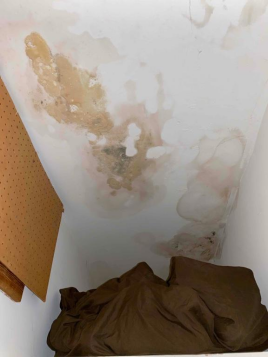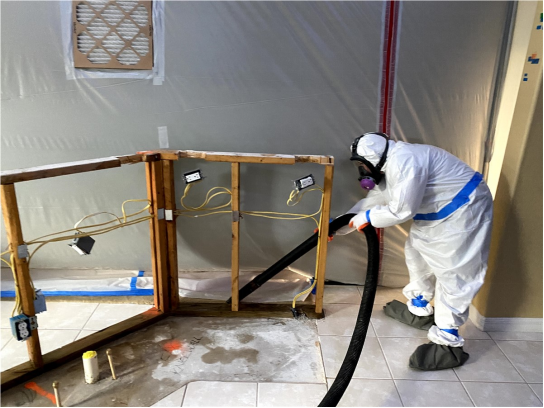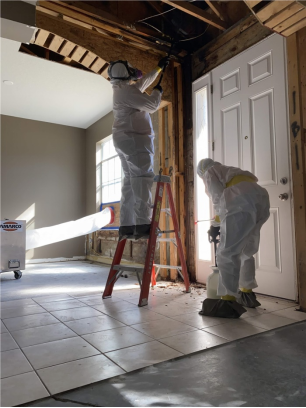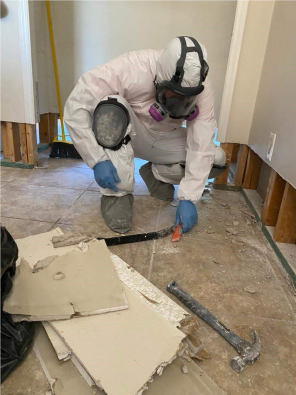
In the city of St. Petersburg, our warm and humid climate offers the perfect breeding ground for unwanted house guests: mold. While discovering mold in your home might seem alarming, it's a common issue that many residents face. However, with the right information and actions, it can be managed effectively, and you can restore your home.
This article is designed to be your guide in making sense of the chaos mold infestations bring.
Understanding Mold
Types of Mold
Here are some common types of mold you might encounter:
Aspergillus: Often found on food and in air conditioning systems, this mold can range in color from white to green or black. It’s relatively less harmful but can cause respiratory issues in sensitive individuals.
Cladosporium: This type can appear as black or olive-green mold, commonly growing on fabrics, woods, and other damp, porous materials. It is known for causing allergies and asthma.
Stachybotrys atra (Black Mold): This notorious mold is black and slimy, preferring areas with persistent moisture. It produces toxins that can lead to severe health problems, making it particularly dangerous.
Causes and Common Locations
Mold thrives in moist environments and can start growing within 24 to 48 hours after exposure to water. Here are typical scenarios and locations in your home where mold might establish itself:
Bathrooms and Kitchens: Constant use of water and high humidity make these areas prime spots for mold growth.
Basements and Crawl Spaces: These lower areas of your home often have poor ventilation and can trap moisture, especially after flooding or leaks.
Windows and Exterior Walls: Condensation on windows and seepage through walls can provide enough moisture for mold to grow.

Health Risks Associated with Mold
Immediate Health Effects
Exposure to mold can lead to a variety of allergic reactions and respiratory problems. Common symptoms include:
Allergic Reactions: Sneezing, runny nose, red eyes, and skin rash. Mold allergies are particularly troublesome for people with asthma, as they can trigger asthma attacks.
Respiratory Issues: Even in non-allergic individuals, mold can cause coughing, wheezing, and throat irritation. Prolonged exposure may lead to more severe respiratory conditions.
Long-term Health Risks
Long-term exposure to certain molds, especially toxic varieties like black mold, can have more serious implications, including:
Chronic Respiratory Diseases: Prolonged exposure can contribute to the development of chronic respiratory diseases and can exacerbate conditions such as asthma and chronic obstructive pulmonary disease (COPD).
Mycotoxin Poisoning: Some molds produce mycotoxins that can be especially harmful when ingested or inhaled, potentially leading to neurological problems and, in extreme cases, death.
Psychological Impact
The presence of mold can also affect mental health, primarily through the stress and anxiety associated with discovering and dealing with an infestation. Long-term exposure to a moldy environment may also contribute to feelings of depression and helplessness, especially if the infestation proves difficult to control or eradicate.

First Steps to Take When You Spot Mold
Safety First
Before you begin addressing the mold, ensure your safety and that of your household:
Protective Gear: Wear protective clothing, including gloves, eyewear, and a face mask or respirator to prevent inhalation of spores.
Ventilation: Increase airflow in the affected area by opening windows and using fans, but avoid spreading spores to other parts of the house.
Assessment
Carefully evaluate the extent and type of mold present:
Size of the Area: If the mold covers a small area (less than 10 square feet), you might manage it yourself with proper precautions. Larger infestations typically require professional help.
Source Identification: Try to determine where the moisture that's feeding the mold is coming from. This could be due to leaks, condensation, or inadequate ventilation.
When to Call Professionals
In many cases, it's advisable to call in professional mold remediation services:
Extensive Growth: If the mold covers a large area or if you suspect it's in your HVAC system, professional remediation is necessary.
High-Risk Occupants: If your household includes babies, elderly people, or those with respiratory conditions or weakened immune systems, do not attempt to handle mold yourself.
Recurring Mold: If you've cleaned mold but it keeps returning, this suggests an underlying issue that likely requires professional assessment and treatment.

Choosing the Right Mold Remediation Service
Certifications and Experience
Certifications: Look for a service that holds certifications from reputable industry organizations, such as the Institute of Inspection, Cleaning and Restoration Certification (IICRC) or the American Council for Accredited Certification (ACAC). These certifications ensure that the company adheres to strict industry standards.
Experience: Choose a company with extensive experience in mold remediation. Experienced professionals are more likely to identify all sources of mold and effectively remove it.
Methods Used
Assessment Techniques: Ensure the company uses advanced methods to assess mold presence and the extent of the infestation, such as moisture meters and infrared cameras.
Remediation Techniques: Ask about the techniques they use for mold removal. Effective methods should include containment and air filtration to prevent the spread of spores, along with safe and thorough cleaning and disinfecting processes.
Post-Remediation Verification: Check if the company offers post-remediation verification to confirm that the mold has been completely removed. This often involves surface sampling and air quality tests.
Reviews and References
Customer Reviews: Look for reviews and testimonials from previous clients to gauge the quality of the company’s services.
References: Don’t hesitate to ask for references. A reputable company will be happy to provide contact details for previous clients who can vouch for their service quality.
Take Action Now to Restore Your Home!
At Flood Pros USA, we specialize in comprehensive mold remediation services that tackle everything from identification to full restoration. Our expert team provides mold remediation in St. Petersburg, FL, ensuring your home is not only mold-free but safe and healthy for everyone inside. We also offer same-day restoration services to address your urgent needs promptly.
Contact Flood Pros USA today for reliable mold cleanup in St. Petersburg and get your home back in perfect shape.
Tags
Subscribe to Flood Pros USA's Blog


Comments